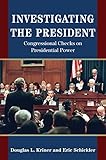Investigating the President : Congressional Checks on Presidential Power / Eric Schickler, Douglas L. Kriner.
Material type: TextPublisher: Princeton, NJ : Princeton University Press, [2016]Copyright date: ©2017Description: 1 online resource (304 p.) : 1 halftone. 18 line illus. 37 tablesContent type:
TextPublisher: Princeton, NJ : Princeton University Press, [2016]Copyright date: ©2017Description: 1 online resource (304 p.) : 1 halftone. 18 line illus. 37 tablesContent type: - 9780691171852
- 9781400883639
- Executive power -- United States
- Governmental investigations -- United States
- Legislative oversight -- United States
- POLITICAL SCIENCE / American Government / Executive Branch
- American political history
- American politics
- Obama administration
- Republicans
- U.S. Congress
- U.S. Senate
- balance of power
- congressional action
- congressional investigations
- executive branch
- executive misconduct
- executive wrongdoing
- investigative power
- investigative powers
- military policy
- policy change
- political pressure
- presidential actions
- presidential aggrandizement
- presidential behavior
- presidential power
- presidentialУongressional relations
- public opinion
- separation of power
- 328.7307456 23
- JK585 .K76 2018
- online - DeGruyter
- Issued also in print.
| Item type | Current library | Call number | URL | Status | Notes | Barcode | |
|---|---|---|---|---|---|---|---|
 eBook
eBook
|
Biblioteca "Angelicum" Pont. Univ. S.Tommaso d'Aquino Nuvola online | online - DeGruyter (Browse shelf(Opens below)) | Online access | Not for loan (Accesso limitato) | Accesso per gli utenti autorizzati / Access for authorized users | (dgr)9781400883639 |
Frontmatter -- Contents -- List of Tables and Figures -- Acknowledgments -- Chapter 1: Introduction -- Chapter 2: When Congress Investigates -- Chapter 3: Investigations and Public Opinion -- Chapter 4: The Direct Influence of Congressional Investigations on Policy Outcomes -- Chapter 5: The Indirect Influence of Congressional Investigations on Policy Outcomes -- Chapter 6: Investigations in the Age of Obama -- Chapter 7: Conclusion -- References -- Index
restricted access online access with authorization star
http://purl.org/coar/access_right/c_16ec
Although congressional investigations have provided some of the most dramatic moments in American political history, they have often been dismissed as mere political theater. But these investigations are far more than grandstanding. Investigating the President shows that congressional investigations are a powerful tool for members of Congress to counter presidential aggrandizement. By shining a light on alleged executive wrongdoing, investigations can exert significant pressure on the president and materially affect policy outcomes.Douglas Kriner and Eric Schickler construct the most comprehensive overview of congressional investigative oversight to date, analyzing nearly thirteen thousand days of hearings, spanning more than a century, from 1898 through 2014. The authors examine the forces driving investigative power over time and across chambers, identify how hearings might influence the president's strategic calculations through the erosion of the president's public approval rating, and uncover the pathways through which investigations have shaped public policy. Put simply, by bringing significant political pressure to bear on the president, investigations often afford Congress a blunt, but effective check on presidential power-without the need to worry about veto threats or other hurdles such as Senate filibusters.In an era of intense partisan polarization and institutional dysfunction, Investigating the President delves into the dynamics of congressional investigations and how Congress leverages this tool to counterbalance presidential power.
Issued also in print.
Mode of access: Internet via World Wide Web.
In English.
Description based on online resource; title from PDF title page (publisher's Web site, viewed 24. Aug 2021)


